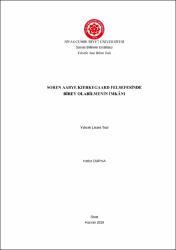Soren Aabye Kierkegaard Felsefesinde Birey Olabilmenin İmkânı
Abstract
Hem yaşamış olduğu döneme hem de sonraki dönemlere olan etkisiyle felsefe tarihinde ve varoluşçu felsefenin oluşumunda önemli bir yeri olan Kierkegaard, birey kavramına verdiği önemle dikkat çeker. Bu çalışmada ilk olarak yaşam biçimi ve görüşleriyle bir tepki felsefesi ortaya koymuş olan Kierkegaard'ın aile üyeleriyle ve akademik çevresiyle olan eleştirel - tepkisel ilişkilerinin şekillendirdiği hayatının önemli kesitleri ile onun felsefesini şekillendiren kavram, kişi ve olaylara dikkat çekilmiştir. İkinci bölümde Kierkegaard'ın bireyin öznelliği ve özgürlüğünü temellendirişi ile birey olma yolunda karşılaşılan engeller ele alınmıştır. Üçüncü bölümde Kierkegaard'ın öne sürmüş olduğu estetik, etik ve dinsel varoluş boyutları bağlamında kişinin gerçek manada birey olmasının imkânı ile onun bu süreci nasıl gerçekleştirdiğine ilişkin görüşleri irdelenmiştir. Kierkegaard, who has an important place in the history of philosophy and in the formation of existential philosophy with its effect on both the period of its existence and the later periods, draws attention with the importance it attaches to the concept of individual. In this study, it was pointed out that the important sections of his life shaped by the critical-reactionary relations between Kierkegaard and his family members and the academic environment and the concepts, people and events that shaped his philosophy have been pointed out. In the second chapter, Kierkegaard’s obstacles on becoming an individual, foundation of freedom and individual subjectivity are discussed. In the third chapter, Kierkegaard's ideas about the aesthetics, ethics and religious existence dimensions and the possibility of the individual being an individual person are examined.















